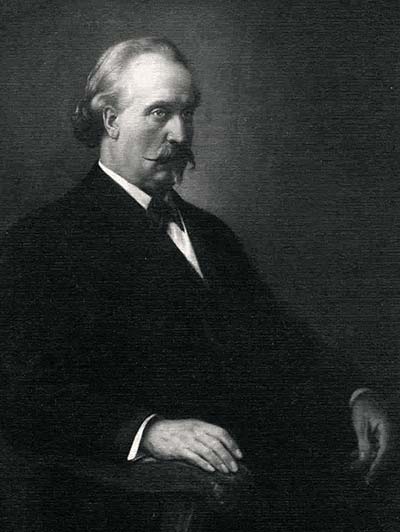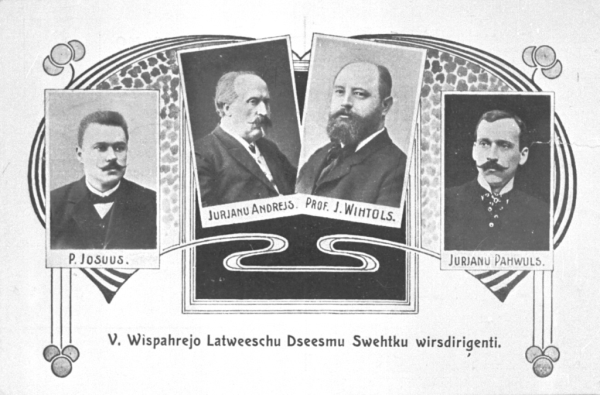Andrejs Jurjāns
1856–1922
Conductor, composer, folklore collector, music critic
Andrejs Jurjāns or Jurjāna Andrejs is a notable Latvian conductor, folklorist and composer, and initiator of the Latvian cantata, symphonic music, suite and concert genres.
Born 30 September 1856 at the Meņģeli homestead in Ērgļi Parish. Studied at the Ērgļi and Vecpiebalga congregation school and obtained his secondary education at Rīga’s Katrina School (1873-1874). Studied organ, composition and French horn at the St Petersburg Conservatory (1875-1882). Composed his first pieces during his studies, which were published in the collection Daiņa (1877).
After graduating from the Conservatory, worked at the Imperial Russian Music Society’s Kharkiv School of Music, later in the Conservatory (1882-1916). Founded the Kharkiv Latvian Assistance Society (1899) and choir, organised church services at which he played organ, and worked as a music critic in Kharkiv’s Russian newspaper. At the same time, stayed in touch with Latvian musicians – he founded the Jurjāns Brothers’ French-horn Quartet, embarked on folklore gathering expeditions in Vidzeme and Kurzeme, and worked on the Rīga Latvian Society’s Music Committee. In 1920, he was appointed the first Honorary Professor of Latvia’s Conservatory.
He was a chief conductor at the IIIrd, IVth and Vth All-Latvian Song Festivals, and actively participated in their organisation and the preparation of singers. A jury member at the IInd-Vth All-Latvian Song Festival choir competitions.
Andrejs Jurjāns’ compositions, mainly folk songs, continue to be included in the main song-festival repertoire to this day. His most commonly sung compositions include Pūt, vējiņi (Blow Wind, Blow), Aiz upītes es uzaugu (I Grew up Beyond the River), Kur tu skriesi, vanadziņi (What’s Your Hurry, Hawk), Lūk, roze zied (The Singing Rose), and the Tēvijai (For the Fatherland) cantata.
“This crystal clear, selfless person, embodiment of awkwardness in daily life, for whom pursuing any policy in one’s own interests is absolutely alien, who lived only for his people and their aspirations – this person, of course, could never attain material wealth; but hence the richer his prize in respect and love, a prize he accumulated throughout his life,” Straumes Jānis in 1922. (Grauzdiņa, Ilma, Izredzētie (The Chosen Few), 2008, p 30)




![Jurjānu Andrejs :[monogrāfija]](https://dziesmusvetki.lndb.lv/wp-content/uploads/objects/488661/resized/2resized_thumbnail.png)
![Jurjānu Andrejs mūzikas kultūrā un tautā =Андрей Юрьян в музыке и жизни народа : [apcere, studijas "Līgotnes" reprodukcijas, komentāri]](https://dziesmusvetki.lndb.lv/wp-content/uploads/objects/488669/resized/2resized_thumbnail.png)

